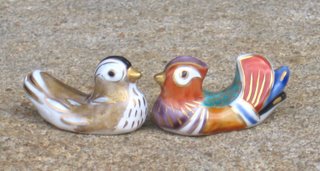:::::::::::::::::::::::::::::::::::::::::::::::::::::::::::::::::::::::::::::::::::::::::::::::::::::
Waiwai Tennoo わいわい天王 - Waiwai Tenno (Hotei)
The Ryu'un-ji Collection

波屋世哉 古渡毛 和夷輪以登 葉也生
Hayase ya kodomo waiwai to hayase
Cheer me on, kids!
Shouting “yeh! yeh! yeh!”,
cheer me on!
“Waiwai” is onomatopoeia for the excited shouts of little children.
The “Waiwai Tenno” were beggars who solicited alms by performing on the street and passing out talismans of the deity Gozu Tenno.
Here a Waiwai Tenno, portrayed as Hotei (that is, Hakuin), hands out his talismans, just as Hakuin freely offers his dharma teaching.
source : hanazono.ac.jp/hakuin/
. Gozu Tenno 牛頭天王 .
Heavenly King with an Ox-Head,
Bull Head Heavenly King
.............................................................................

はやせや子ども お天王のまつりじや
まぶりをとらそ わひわひとはやせ
hayase kodomo O-Tennoo Matsuri ja
maburi o toraso waiwai to hayase
source : www.myoshin-zen-c.jp
:::::::::::::::::::::::::::::::::::::::::::::::::::::::::::::::::::::::::::::::::::::::::::::::::::::
H A I K U
Kobayashi Issa 小林一茶
ka-ibushi o hayashite yuku ya yuugarasu
at dusk loud praise
for my anti-mosquito smoke --
the crow flies on
This humorous hokku was written in the 4th month (May) in 1810, when Issa was in the area just east of Edo. In Issa's time the main mosquito repellant was smoke from burning pine needles, or occasionally cedar needles or wormwood leaves. The needles were placed in censer-like earthenware containers, often sake bottle shapes with holes in them or pig shapes with large holes in front and back. Pine needles were chosen not only for their smoke but for their strong smell -- they were much more unpleasant than the mild scent given off by the punk now used as a repellant. The hokku is of course ironic, and the crow expletives were no doubt so strong Issa felt he couldn't repeat them.
In other hokku Issa also uses similar expressions in straightforward ways. For example, in the following hokku Issa uses the same verb as in the above hokku to ask a nightingale (hototogisu, one of whose names is meido no tori, bird of the other world) to accompany the soul of a newly dead frog on its journey to the other world (and probably to the Pure Land) with its soulful, otherworldly song:
hiki-dono no tomurai hayase hototogisu
nightingale
sing out, soothe the soul
leaving Lord Frog
Tr. and Comment by Chris Drake
:::::::::::::::::::::::::::::::::::::::::::::::::::::::::::::::::::::::::::::::::::::::::::::::::::::
. Festivals, Ceremonies, Rituals - SAIJIKI .
. Amulets and Talismans from Japan .
[ . BACK to WORLDKIGO TOP . ]
[ . BACK to DARUMA MUSEUM TOP . ]
:::::::::::::::::::::::::::::::::::::::::::::::::::::::::::::::::::::::::::::::::::::::::::::::::::::








No comments:
Post a Comment